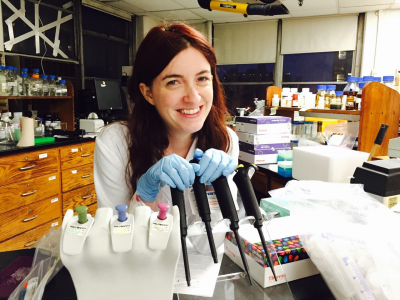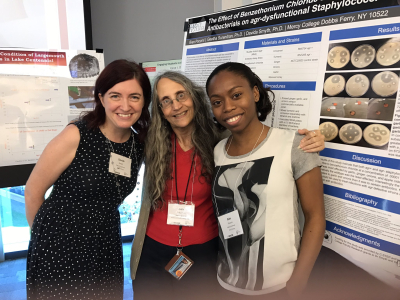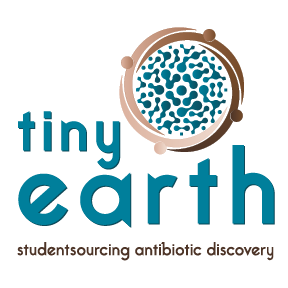 The National Association of Biology Teachers (NABT) recently awarded Dr. Davida Smyth, a Tiny Earth Partner Instructor (TEPI) since 2019 and previously a member of the Tiny Earth Symposium committee, the Four-Year College & University Section Biology Teaching Award. The award recognizes innovative research and creativity in undergraduate biology and education.
The National Association of Biology Teachers (NABT) recently awarded Dr. Davida Smyth, a Tiny Earth Partner Instructor (TEPI) since 2019 and previously a member of the Tiny Earth Symposium committee, the Four-Year College & University Section Biology Teaching Award. The award recognizes innovative research and creativity in undergraduate biology and education.
Dr. Smyth is an Associate Professor in the Department of Life Sciences at Texas A&M University-San Antonio (TAMUSA). Her research spans wastewater epidemiology, microbial ecology and genomics, antibiotic resistance in urban ecosystems, science education, and civic engagement. She has previously held positions as Associate Professor of Natural Sciences at Eugene Lang College of Liberal Arts at The New School in New York, Associate Professor and Chairperson of the Department of Natural Sciences at Mercy College School of Health and Natural Sciences (New York), and Assistant Professor of Biology at New York City College of Technology (NYCCT).
Dr. Smyth has earned teaching awards, held editorial positions with premier scientific journals, and is involved in SENCER (Science Education for New Civic Engagements and Responsibilities). She has participated in SENCER since 2014 and began serving as a Senior Leadership Fellow in 2018. She is also a PULSE Fellow and Ambassador, Deputy Director of the National Center for Science and Civic Engagement, and a co-PI on the NSF RCN-UBE Research Experiences in Microbiomes Network and the NSF IUSE Vision and Change in Undergraduate General Education Biology Courses.
Tiny Earth students working with Dr. Smyth explore the impact of built environments and anthropogenic activity on antibiotic resistance. At The New School, Tiny Earthlings searched for novel antibiotic-producing bacteria in New York City urban soil and water environments. Her current team of undergraduate researchers at Texas A&M University-San Antonio samples soil from construction sites in rural areas, analyzing microbiomes and geochemical profiles. Additionally, she works to improve scientific literacy and aims to embed research experiences into her undergraduate curriculum to foster student success. Dr. Smyth’s educational philosophy integrates real-world problems and active research into her classroom. She believes in discovery-driven research to engage students in research and provides mentorship whenever possible.
She explains that diversity, equity, and inclusion have always been at the core of her teaching. Her academic journey began at the University of Ireland, Trinity College, where she earned her Ph.D. in Microbiology. Dr. Smyth is a first-generation student from a working-class family in Ireland and acknowledges the role of free post-secondary education in her success. Despite growing up in a homogenous population, Smyth learned important lessons of compassion through hardship. “Irish people tend to do a lot for others—that’s part of our culture. Education is what got us out [of ignorance].”
Dr. Smyth completed postdoctoral training at New York Medical College, the University of Mississippi Medical Center, and New York University. Exposure to one of the most diverse cities in America (New York City) and later working at a Hispanic-serving institution (TAMUSA) meant “hit[ting] the books myself along with other faculty to educate ourselves” and have intentional conversations with students. At that point, the importance of civic engagement became clear to her, as well as the need for the implementation of AJEDI (antiracism, justice, equity, diversity, and inclusion) principles in the classroom. “As a foreigner, I did not have the same lived experience as my students… I tell my students I’m not from here, and we’re very different.”
“The honor is on me to give [students] the best possible experience to help them understand how science works. If I can do that then I’ve been successful… I’m aware of the fact that students can’t just drop everything to do research. Anything we can do to give them more opportunities and mentoring, the better.” — Dr. Davida Smyth

Diverse experiences and hardship are lenses that Dr. Smyth uses in her approach to instruction, aiming to teach through real-world issues that are of importance to students while contextualizing these problems in the research lab. She engages students by making her curriculum not only inclusive and equitable but also relatable. Developing a Course-Based Undergraduate Research Experience (CURE) through Tiny Earth helped Dr. Smyth see her educational philosophy come to fruition. She loves the Tiny Earth network because it gives students and TEPIs the opportunity to engage in research with like-minded individuals. Tiny Earth allows Dr. Smyth to closely mentor a diverse array of students as they enter the world of research, which has always been at the forefront of her career.
Impressed by various groups rising to the challenges of diversity and inclusion efforts, Dr. Smyth emphasizes the Tiny Earth network’s unique commitment to AJEDI: Leading the charge, providing concrete materials and strategies to implement the principles, and making diversity integral to the CURE. “I feel lucky to be on the periphery of all this work.”
The impact of CUREs, positive student feedback, the importance of saving our soils, and “a lovely community” are a few of the many reasons Dr. Smyth advocates for teaching Tiny Earth. “Just do it and get involved!”
Congratulations Dr. Davida Smyth and thank you for all of your contributions to your students, the network, and the scientific teaching community!
—Ellie Thoma (Tiny Earth Student Group Leadership) and Trang Tran (Tiny Earth Outreach Specialist)

